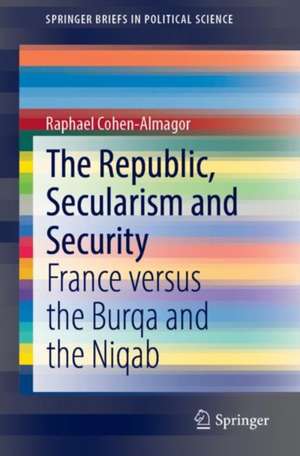The Republic, Secularism and Security: France versus the Burqa and the Niqab: SpringerBriefs in Political Science
Autor Raphael Cohen-Almagoren Limba Engleză Paperback – 25 feb 2022
The book argues that while this motto of the French Revolution is still symbolically and politically important, its practical significance as it has been translated to policy implementation has been eroded. It shows how the emergence of the new trinity at the expense of the old one is evident when analyzing the debates concerning cultural policies in France in the face of the Islamic garb, the burqa, and the niqab, which are perceived as a challenge to France’s national secular raison d'être. Subsequently, the book raises various important questions, such as: Is the burqa and niqab ban socially just? Does it reasonably balance the preservation of societal values and freedom of conscience? What are the true motives behind the ban? Has the discourse changed in the age of COVID-19, when all people are required to wear a mask in the public space?
Din seria SpringerBriefs in Political Science
-
 Preț: 410.94 lei
Preț: 410.94 lei -
 Preț: 259.57 lei
Preț: 259.57 lei -
 Preț: 375.62 lei
Preț: 375.62 lei -
 Preț: 478.53 lei
Preț: 478.53 lei -
 Preț: 411.16 lei
Preț: 411.16 lei -
 Preț: 379.48 lei
Preț: 379.48 lei -
 Preț: 226.22 lei
Preț: 226.22 lei -
 Preț: 378.71 lei
Preț: 378.71 lei -
 Preț: 342.25 lei
Preț: 342.25 lei -
 Preț: 379.48 lei
Preț: 379.48 lei -
 Preț: 443.58 lei
Preț: 443.58 lei -
 Preț: 125.07 lei
Preț: 125.07 lei -
 Preț: 358.32 lei
Preț: 358.32 lei -
 Preț: 475.65 lei
Preț: 475.65 lei -
 Preț: 379.48 lei
Preț: 379.48 lei -
 Preț: 378.54 lei
Preț: 378.54 lei -
 Preț: 342.84 lei
Preț: 342.84 lei -
 Preț: 379.68 lei
Preț: 379.68 lei -
 Preț: 309.04 lei
Preț: 309.04 lei - 15%
 Preț: 520.30 lei
Preț: 520.30 lei -
 Preț: 380.84 lei
Preț: 380.84 lei -
 Preț: 374.85 lei
Preț: 374.85 lei -
 Preț: 377.73 lei
Preț: 377.73 lei -
 Preț: 378.54 lei
Preț: 378.54 lei -
 Preț: 444.94 lei
Preț: 444.94 lei -
 Preț: 374.85 lei
Preț: 374.85 lei -
 Preț: 379.86 lei
Preț: 379.86 lei -
 Preț: 476.21 lei
Preț: 476.21 lei -
 Preț: 377.73 lei
Preț: 377.73 lei -
 Preț: 444.13 lei
Preț: 444.13 lei -
 Preț: 446.65 lei
Preț: 446.65 lei -
 Preț: 444.52 lei
Preț: 444.52 lei -
 Preț: 376.59 lei
Preț: 376.59 lei -
 Preț: 376.59 lei
Preț: 376.59 lei -
 Preț: 375.07 lei
Preț: 375.07 lei -
 Preț: 261.53 lei
Preț: 261.53 lei -
 Preț: 376.22 lei
Preț: 376.22 lei -
 Preț: 259.57 lei
Preț: 259.57 lei -
 Preț: 380.07 lei
Preț: 380.07 lei -
 Preț: 261.32 lei
Preț: 261.32 lei -
 Preț: 375.45 lei
Preț: 375.45 lei -
 Preț: 310.18 lei
Preț: 310.18 lei -
 Preț: 378.54 lei
Preț: 378.54 lei - 5%
 Preț: 356.11 lei
Preț: 356.11 lei -
 Preț: 477.34 lei
Preț: 477.34 lei -
 Preț: 343.72 lei
Preț: 343.72 lei - 15%
 Preț: 462.05 lei
Preț: 462.05 lei -
 Preț: 379.30 lei
Preț: 379.30 lei -
 Preț: 378.71 lei
Preț: 378.71 lei
Preț: 375.84 lei
Nou
Puncte Express: 564
Preț estimativ în valută:
71.93€ • 78.10$ • 60.42£
71.93€ • 78.10$ • 60.42£
Carte tipărită la comandă
Livrare economică 22 aprilie-06 mai
Preluare comenzi: 021 569.72.76
Specificații
ISBN-13: 9783030946685
ISBN-10: 3030946681
Pagini: 66
Ilustrații: XIII, 66 p. 12 illus.
Dimensiuni: 155 x 235 mm
Greutate: 0.13 kg
Ediția:1st ed. 2022
Editura: Springer International Publishing
Colecția Springer
Seria SpringerBriefs in Political Science
Locul publicării:Cham, Switzerland
ISBN-10: 3030946681
Pagini: 66
Ilustrații: XIII, 66 p. 12 illus.
Dimensiuni: 155 x 235 mm
Greutate: 0.13 kg
Ediția:1st ed. 2022
Editura: Springer International Publishing
Colecția Springer
Seria SpringerBriefs in Political Science
Locul publicării:Cham, Switzerland
Cuprins
Introduction.- The Underpinning Values of the French Republic.- The Shaping of the Republic: The Influence of Colonialism, Immigration, and Terrorism.- Banning the Burga and the Niqab.- Conclusion.
Notă biografică
Raphael Cohen-Almagor is a Professor of Politics and International Studies and Founding Director of the Middle East Study Group, University of Hull (UK). He completed his DPhil in Political Theory at St. Catherine’s College, University of Oxford (UK). Cohen-Almagir taught, inter alia, at Oxford (UK), Jerusalem, Haifa (Israel), UCLA, Johns Hopkins (USA), and Nirma University (India). He also was a Senior Fellow at the Woodrow Wilson International Center for Scholars, Washington DC (USA), and Distinguished Visiting Professor, Faculty of Laws, University College London (UK). In 2021-2022, he is Public Policy Fellow at the Woodrow Wilson International Center for Scholars, and in 2023 will inhabit the Olof Palmes's Guest Professorship, Lund University (Sweden). Cohen-Almagor is the founder of Israel’s “Second Generation to the Holocaust and Heroism Remembrance” Organization, The University of Haifa Center for Democratic Studies, The Van Leer Jerusalem Institute Medical Ethics Think-tank, and The University of Hull Middle East Study Group/Centre. He has published extensively in the fields of politics, philosophy, media ethics, medical ethics, law, sociology, and history.
Caracteristici
Explains how French history shaped the ideology of secularism and of public civil religion Analyzes cultural policies in France in the face of the Islamic garb, the burqa, and the niqab Sheds light on the true motives behind the ban
